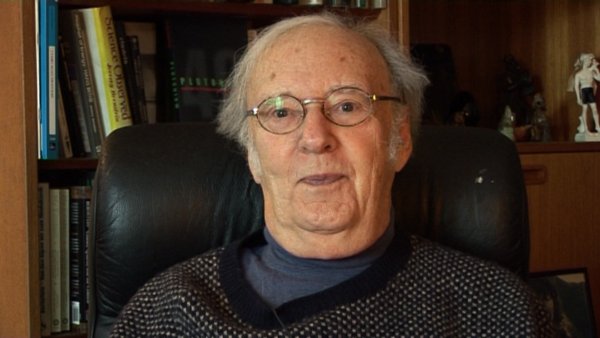NEXT STORY

Choosing physics
RELATED STORIES

NEXT STORY

Choosing physics
RELATED STORIES


|
Views | Duration | |
|---|---|---|---|
| 11. Playing the trumpet | 340 | 00:35 | |
| 12. Where should I go to college? | 467 | 02:17 | |
| 13. How to steer clear of trouble | 377 | 01:15 | |
| 14. I had no interest in becoming a scientist | 378 | 02:02 | |
| 15. Understanding the theory of relativity | 654 | 02:52 | |
| 16. Philipp Frank lectures | 533 | 03:05 | |
| 17. Am I smart enough to take calculus? | 1 | 708 | 02:52 |
| 18. The difference between Schwinger's and Weiskopf's lectures | 947 | 01:33 | |
| 19. You have to decide: physics or maths | 1 | 654 | 03:47 |
| 20. Choosing physics | 503 | 01:48 |


I got a Master's degree in mathematics, and then Gerhard Berkhoff, whom I always referred to as a permanently rotating chairman of the Mathematic Department, called me in, said, 'You're taking too many physics courses. You've got to decide, what are you? A physicist or a mathematician?'
Well, by this time I knew mathematicians. I knew my tutor, George Mackey, and I knew some students who were mathematicians, and I knew that I was not a mathematician. I could… I was a good math student, I got A's in my courses, but I knew I couldn't create the stuff. I just somehow knew that. And also, I knew that my understanding was not an understanding… I remember there was an Indian, Abhyankar.
I lived in a graduate dorm, and I came in one day and there was an Indian sitting on my bed. And he said, 'I'm Abhyankar.' I said, 'I'm Bernstein, get off my bed.'
Then he said, 'You are taking complex variables.' I said, 'yes'. He said, 'I don't go to class, because it's in the day.' [I said] 'I know'. He said, 'But I hear you take very good notes.' [I said] 'No, I don't take very good notes, I just take some notes'. He said, 'I want to look at your notes'. [I said] 'Alright'.
He looks at my notes, and then he starts saying, 'Oh yes, I see. We go around…' (we were doing compass integration). 'Oh, we go around… oh yes, we go around that plane there. Oh. But look, that's very dangerous, because the singularity, you've got to be very careful.' And I could see that he had a completely different way of seeing these things than I did. I… you know. I knew there was a singularity, but I didn't see any planes or anything, and so I just knew it was a difficult thing. And then my friend Zemach, that was another lesson.
I guess I must have been about a junior, then. I'd heard of Zemach. He'd come from Stuyvesant High School in New York. When he got to Harvard, he knew all the graduate and undergraduate curricula in physics and mathematics. And he was being privately looked after. They thought this guy was another Oppenheimer, and, you know…
So I met him and I asked him, 'Would you like to play chess?' [He said] 'Yes, let's play chess.' Well, before we play chess, I heard of a problem somewhere. The problem was the problem of 12 balls. You have 12 identical balls, one of which is heavier or lighter, and you have a scale balance. And you have to find a method in three ways to tell which is the guilty ball that's heavier or lighter. And I stayed up all night and solved that problem. I was very, very pleased with myself. So we were sitting there, and I said to Zemach, 'By the way, have you ever heard of the problem of the 12 balls?' 'No, no [sic]'. I told him the problem of 12 balls. So we're setting up the thing and Zemach said, 'Oh yes, I see how to do that. And also how to do that with n balls and m ways. So I knew that this was someone who was in another league here. Another league.
But the thing you learn is that if you're stubborn and work, you can… even though you're not that smart, you can do stuff, get stuff done.
Born in 1929, Jeremy Bernstein is an American physicist, educator and writer known for the clarity of his writing for the lay reader on the major issues of modern physics. After graduating from Harvard University, Bernstein worked at Harvard and at the Institute of Advanced Studies at Princeton. In 1962 he became an Associate Professor of Physics at New York University, and later a Professor of Physics at Stevens Institute of Technology in Hoboken, a position he continues to hold. He was also on the staff of The New Yorker magazine.
Title: You have to decide: physics or maths
Listeners: Christopher Sykes
Christopher Sykes is an independent documentary producer who has made a number of films about science and scientists for BBC TV, Channel Four, and PBS.
Tags: Harvard University, Derek Bruff, George Mackey
Duration: 3 minutes, 47 seconds
Date story recorded: 15th June 2011
Date story went live: 17 August 2011